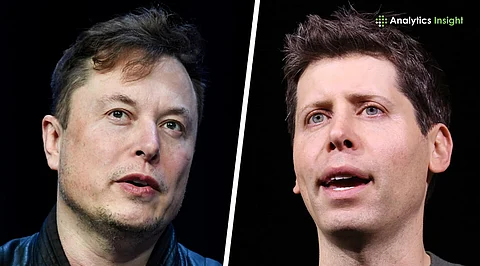Business
Musk and Altman Rivalry Fuels AI Arms Race and Startup Evolution

The escalating rivalry between Elon Musk and Sam Altman is transforming the artificial intelligence landscape and reshaping the startup ecosystem. Their conflict, which has evolved from collaboration to contention, highlights the intense competition in AI leadership and the critical need for both technological resources and strategic partnerships.
Origins of the Conflict
In 2015, Musk and Altman co-founded OpenAI with the aim of advancing artificial intelligence while ensuring its safety and accessibility. Initially, their partnership yielded significant advancements in AI technologies. However, tensions began to surface when OpenAI shifted from a nonprofit model to a hybrid for-profit structure in 2019. This pivot raised concerns for Musk, who criticized OpenAI for deviating from its foundational mission of making AI a public asset.
The strain escalated into legal disputes, with Musk filing a lawsuit against OpenAI for fraud and breach of contract. In response, OpenAI accused Musk’s xAI of improperly recruiting its employees and violating trade secrets related to its AI chatbot, Grok. Both parties characterized these legal skirmishes as business disputes, reflecting the broader competitive landscape among AI firms.
Striving for Dominance
Despite ongoing legal challenges, both Musk and Altman are intensifying their efforts to secure dominance in the AI sector. OpenAI’s valuation has skyrocketed to over $500 billion, surpassing Musk’s SpaceX and establishing it as the most valuable startup globally. OpenAI continues to drive innovation with advanced AI models, expanding partnerships, and securing high-quality computing resources.
Meanwhile, Musk is determined to elevate xAI’s position through substantial infrastructure investments. In Memphis, Tennessee, he is developing a gigawatt-scale natural gas power plant alongside a million-square-foot data center, referred to as ‘Colossus 2,’ aimed at powering Grok. With projected investments reaching $50 billion, Musk’s strategy merges AI advancements with control over essential infrastructure, emphasizing the significance of raw computing power in this competitive arena.
The ongoing rivalry underscores the critical need for robust infrastructure to support AI models. OpenAI’s recent partnership with AMD is a strategic maneuver, allowing the company to potentially secure up to 10 percent investment in AMD, positioning it to outperform competitors in chip manufacturing.
As the competition intensifies, the battle for talent and investment is becoming increasingly fierce. Investors are prioritizing firms with scalable infrastructure capabilities, while the quest for top talent is driving companies to innovate and adapt rapidly.
The Musk-Altman feud is influencing not only their respective companies but also the broader tech industry. It is reshaping how startups approach AI development, emphasizing the importance of innovation combined with effective resource management. Both leaders are pushing for technological adoption and setting new industry benchmarks, attracting attention from investors, policymakers, and tech ventures worldwide.
As this rivalry continues to unfold, the implications for Silicon Valley and the global AI landscape are significant. Companies are racing to enhance their computing power, recruit skilled professionals, and develop sophisticated AI applications. This competition is evolving into a complex arena where conflicts over infrastructure and innovation will likely dictate the future of artificial intelligence.
The ongoing disputes and the race for dominance are set to redefine the parameters of success in the AI sector, with the outcomes of this rivalry likely to have lasting impacts on the industry for years to come.
-

 Science2 weeks ago
Science2 weeks agoInventor Achieves Breakthrough with 2 Billion FPS Laser Video
-

 Top Stories3 weeks ago
Top Stories3 weeks agoCharlie Sheen’s New Romance: ‘Glowing’ with Younger Partner
-

 Business3 weeks ago
Business3 weeks agoTyler Technologies Set to Reveal Q3 Earnings on October 22
-

 Entertainment3 weeks ago
Entertainment3 weeks agoDua Lipa Aces GCSE Spanish, Sparks Super Bowl Buzz with Fans
-

 Health3 weeks ago
Health3 weeks agoCommunity Unites for 7th Annual Into the Light Walk for Mental Health
-

 Health3 weeks ago
Health3 weeks agoCurium Group, PeptiDream, and PDRadiopharma Launch Key Cancer Trial
-

 World3 weeks ago
World3 weeks agoR&B Icon D’Angelo Dies at 51, Leaving Lasting Legacy
-

 Entertainment3 weeks ago
Entertainment3 weeks agoRed Sox’s Bregman to Become Free Agent; Tigers Commit to Skubal
-

 Entertainment3 weeks ago
Entertainment3 weeks agoMother Fights to Reunite with Children After Kidnapping in New Drama
-

 Health3 weeks ago
Health3 weeks agoNorth Carolina’s Biotech Boom: Billions in New Investments
-

 Science3 weeks ago
Science3 weeks agoNorth Carolina’s Biotech Boom: Billions Invested in Manufacturing
-

 Top Stories3 weeks ago
Top Stories3 weeks agoDisney+ Launches Chilling Classic ‘Something Wicked’ Just in Time for October









